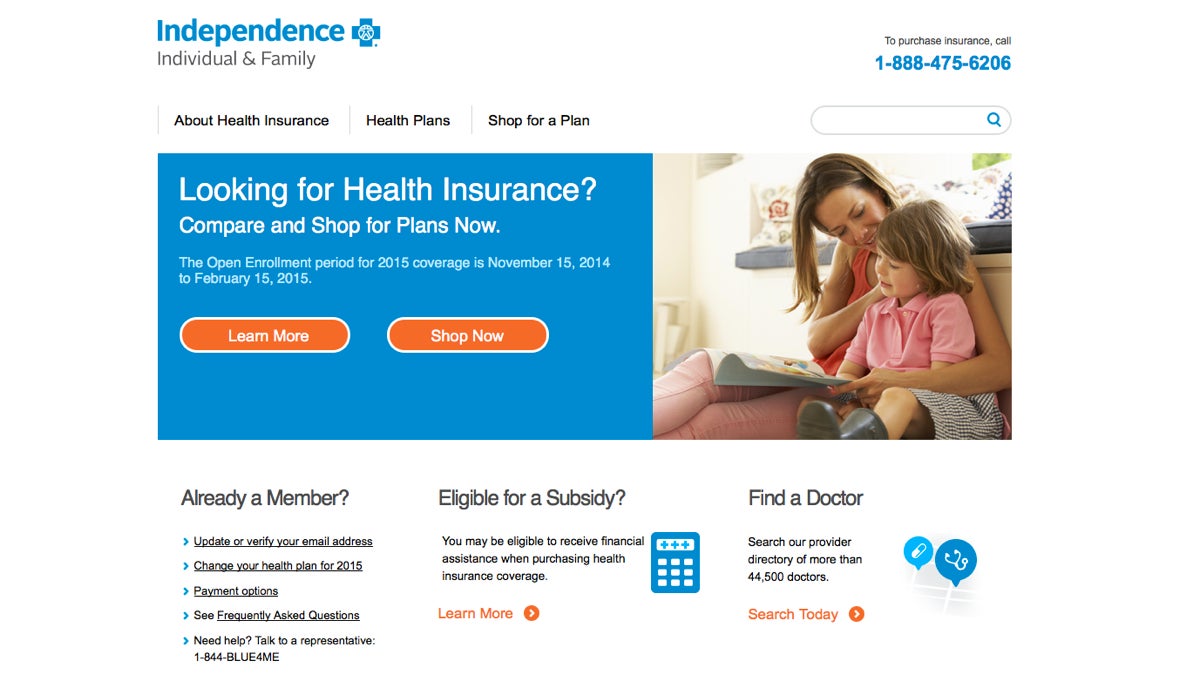Private insurance sites compete with healthcare.gov for new sign-ups

Philadelphia's largest insurer, Independence Blue Cross, started direct enrollment of subsidy-eligible people earlier this month.
While the federal website where individuals can compare and shop for health coverage under the Affordable Care Act is working a lot better during this second enrollment period, more and more insurers are now signing people up for ACA plans directly through their own websites.
The process of direct enrollment, with rules finalized by the Centers for Medicare and Medicaid in October 2013, allows insurers to enroll subsidy-eligible people through their own sites, instead of people going through healthcare.gov and accessing financial subsidies that way.
With all of last year’s technical problems on healthcare.gov, the process got off to a slow start.
Philadelphia’s largest insurer, Independence Blue Cross, started direct enrollment earlier this month.
“You’ll log in. We will then access your record at healthcare.gov if you’re previously enrolled. Or if you’re a new enrollee, we’ll be able to actually go right out and calculate the available subsidy for you and pull back your relevant information,” explained Brian Lobley, senior vice president of marketing and consumer business at IBX.
Lobley added that the process includes additional questions aimed at helping consumers filter through the different plan options, based on things like cost and physician network preferences. “So for the user, it’s a pretty seamless experience for them to enroll.”
Other insurers, including Unitedhealthcare and Aetna, offer direct enrollment to varying degrees. Depending on the product, for example, Aetna offers direct enrollment either through its Coventry website or through a broker website. Assurant is similar.
Insurers have reason to veer people away from the federal website, according to Steven Halper, a health care analyst at FBR Capital Markets.
“If you’re in a local market, and you’re Independence Blue Cross Blue Shield, you don’t want the person comparing from other carriers,” he said. “You want to be able to lock that person in to your own health insurance, right? You don’t want to show them a plan from United. You don’t want to show them a plan from Aetna.”
Another company’s plan, however, might be cheaper.
The government piloted direct enrollment in a handful of states last year. Joanne Grossi, regional director for the U.S. Department of Health and Human Services, said the aim is to improve access to insurance.
“At the end of the day, we’re trying to maximize people’s avenues to buy insurance,” said Grossi. “We want to make sure people have as many doorways to go through as possible in order to buy health insurance, including going directly through their insurers or shopping around in the marketplace.”
The online brokerage service eHealthinsurance is also directly signing people up for ACA plans.
Consumer advocates have mixed reactions to the growing trend among private insurers.
Lynn Quincy, a health policy researcher with Consumers Union, said some worry direct enrollment could limit people’s choice. That’s because when visiting an insurer’s site, someone in the market for coverage sees only plans from that one company rather than being able to compare all the options available.
“It definitely disrupts the idea that we’re going to make this a super-competitive marketplace,” said Quincy. “By only showing [consumers] one choice, it gets them through the task more quickly, but it doesn’t mean they’re finding best health plan for themselves.”
An insurer must notify a consumer that other plan options are available as part of the direct enrollment process. For example, the following statement appears at the bottom of the IBX website after a user’s subsidy is determined:
“Attention: this website is operated by Independence Blue Cross and is not the Health Insurance Marketplace. This website does not display all Qualified Health Plans available through the Health Insurance Marketplace website. To see all available Qualified Health Plan options, go to the Health Insurance Marketplace website at Healthcare.gov.”
Halper, Quincy and others say it’s too soon to know the impact of people going through a private insurer’s website. But, at least for now, healthcare.gov has received plenty of traffic … more than 4 million hits since November.
Disclosure: Independence Blue Cross supports WHYY.
WHYY is your source for fact-based, in-depth journalism and information. As a nonprofit organization, we rely on financial support from readers like you. Please give today.

